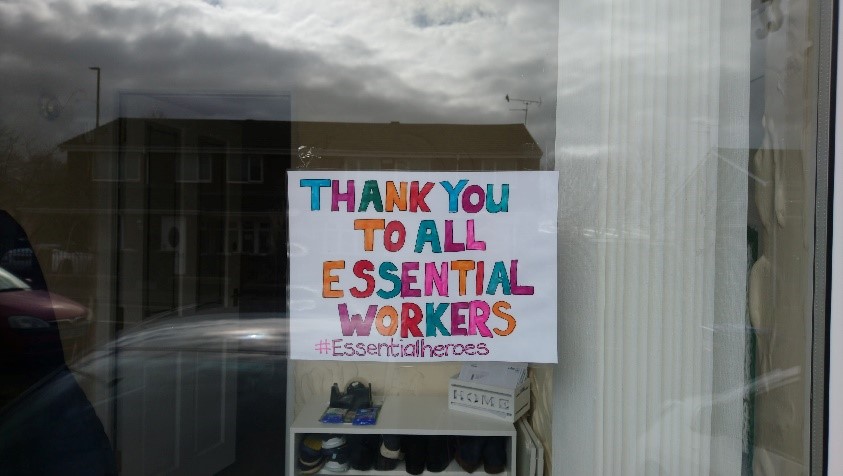Many phrases have entered our common parlance over recent weeks: self-isolation, social distancing, epidemiology, daily state-sanctioned outdoor exercise. Chief among them is key/essential workers.
The government have said that the only reason you should leave the house to go to work is if you are classed as a key worker[1] (cue my favourite joke of the crisis: “Shame about Timpson’s closing, thought they were key workers!”).
Much thanks has, quite rightly, been expressed to NHS workers who are on the front line of fighting COVID-19. The Clap for Carers[2] initiative observed up and down the country on Thursday night was an extraordinary moment of national appreciation. The NHS holds a unifying power with which little else can compete.
However, I hope our gratitude to these vital workers is extended to all those in other professions also still leaving their homes to perform essential roles, therefore putting themselves at increased risk. Funeral directors, factory workers making crucial equipment, prison staff and many more are keeping the country functioning at this challenging time.
That said, it is not the case that they once were not essential, and have only now become so. Lorry drivers have always been essential to our food supply chain, refuse collectors are always essential to stop our streets piling with rubbish, care workers continue to be essential for looking after the elderly and vulnerable. And yet their indispensability is often not reflected in our appreciation of them, or their paycheque for that matter. In fact, many of these workers we rely on so heavily would be deemed “unskilled” under the government’s new immigration proposals.[3]
In 1 Corinthians 12, Paul talks about the Church as Christ’s Body, where no part is disposable and every part is honoured. Verses 23-24 reads “on those parts of the body that we think less honourable we bestow the greater honour… God has so composed the body, giving greater honour to the part that lacked it.”

We can apply this dictum to society as a whole, as well as the Church. As Christians, we have a special impetus to lift up those who are often overlooked or ignored, just as Jesus did. We should be playing a part in giving honour to those workers who may sometimes be denied it. Not just now that their necessity is highlighted, but at all times.
One way we can give people this honour is by giving them our thanks. Indeed, in these times of lockdown and physical distancing, there is little else we can give them. But as Paul instructs us elsewhere, we should “give thanks in all circumstances; for this is God’s will for you in Christ Jesus” (1 Thessalonians 5:18). This means thanking God for them in prayer, but also thanking them directly.
How Can We Thank Essential Workers?
Perhaps one way you might consider thanking these workers might be by placing a sign, placard or poster in your window, with an encouraging message of thanks to all essential workers. As well as encouraging a spirit of thanks within ourselves, it is likely that someone on your street or passing by is in an essential role. Plus, refuse collectors and delivery workers will still be visiting almost every street. Something as simple as seeing a sign of thanks in a window will hopefully help these people feel encouraged and appreciated.

You could also put a picture of yourself with your sign on social media, explaining who you are thankful for and why. Include the hashtag #essentialheroes and encourage you friends and followers to show their thanks too!
Church leaders: perhaps this is something you could encourage your congregations to do as a response to the current climate?
Home-schooling parents: this might be an activity you could do with your children? The more creative the visuals, the better!
As we are confined to our homes, it can feel like our options to practically bless and love people are limited, although JPIT offer some suggestions here. But expressing our gratefulness for those leaving their homes so we can stay in ours is something we can all be part of.
[1] https://www.gov.uk/government/publications/coronavirus-covid-19-maintaining-educational-provision/guidance-for-schools-colleges-and-local-authorities-on-maintaining-educational-provision
[2] https://www.bbc.co.uk/news/uk-52058013
[3] https://www.gov.uk/government/news/home-secretary-announces-new-uk-points-based-immigration-system
